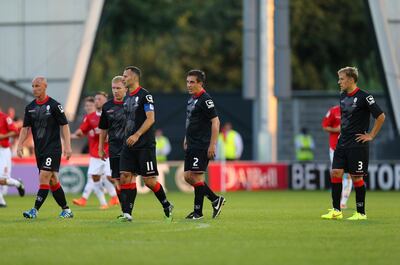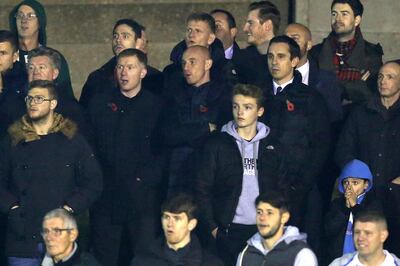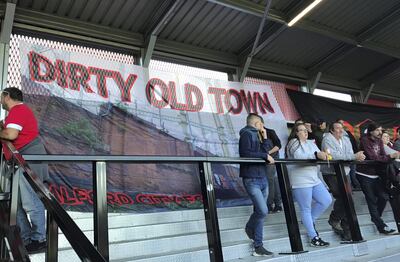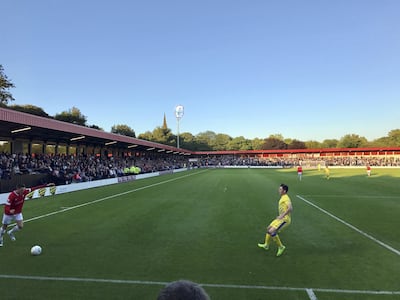Two men in their early forties watch nervously, cursing and praising and arguing like the rest of the 2,358 fans around them. Gary Neville and Paul Scholes, with 1,320 Manchester United appearances between them, are part owners of non-league Salford City.
On Tuesday, they played another SCFC – Stockport County Football Club – two clubs from Greater Manchester with very different histories.
County have spent much of their life as a Football League club – they beat Manchester City away in a league game in 1999 – but they slipped out of the Football League in 2012 and into non-league’s second tier, the National League North, a year later. No established Football League club has dropped as low without going bust and reforming.
Salford City are the opposite, hailing from a city adjacent to Manchester which is England’s largest metropolitan area without a professional football team. Population 233,000 people – 333,000 in 1931 when the docks on the Manchester Ship Canal were thriving – the majority of who call Manchester United their club.
The southern end of Salford comes to within 200 metres of Old Trafford and some of United’s great players are local. Ryan Giggs is a Salford resident since the age of six. Paul Scholes was born in Salford, Stan Pearson, too, while Eddie Colman, the winger known as "Snakehips" who died in the Munich Air disaster was from Salford also. Giggs is also a part owner of Salford City and gets to a dozen or so games a season with his son. Former United players Phil Neville and Nicky Butt also have an interest, plus Singaporean businessman Peter Lim, who in addition owns Spanish club Valencia.
Until their takeover in 2014, Salford pottered around between England’s eighth and ninths tiers, their Moor Lane home boasting two small stands (one was little more than a bus stop) grass banks and a capacity is limited to 1,400 – 10 times their average attendance.
Takeovers rightly attract suspicion from fans sceptical of the motives. Outside the Premier League, football does not make money, but clubs are taken over for a variety of reasons. It might be local businessman putting something back into the community or someone looking for profile, to see his ego massaged.
Salford City is unique. The Class of ’92 do not need profile and, in part because of who they are, Salford City has so far run at a profit.
A friendly game against the Class of ’92 attracted a five-figure crowd and when you have got famous former footballers, sponsorship is easier to attract. Revenue from media helps, too. Crowds surged from 140 to 400, 800 to over a 1,000. Last season’s average was 1,400.
The Class of ’92 lads see Salford as a release, a hobby, a passion. They go and watch live football home and away with their mates – each other.

But who are the new fans? An hour before kick off at a ground which has been three quarters rebuilt in 2017 and will soon accommodate 5,300 fans, Duncan stands by the temporary dressing rooms
“I was a Manchester United season ticket holder for most of the time from my first game in 1966,” he explains. “I gave it up last season.”
Pointing to his heart, factory worker Duncan, says: “United will always be there." Then he points to his pocket and adds, “but it’s not there.” United have not increased ticket pieces for six years, but it is still expensive to watch Premier League football.
“I’ll still go to Old Trafford, but I used to go everywhere,” he adds. “I’m a Salford lad and I started coming here with my daughter. Our season tickets cost £100 [Dh472] for two of us; that’s two games at Old Trafford.
“It’s real football here and you can decide on the morning of a game if you want to go. It used to be like that at Old Trafford.
"It feels real here, you can see it really matters to the players and the managers talk to us before games and say: ‘If you want to know anything, just ask us’”.
His daughter Rachel, 25, agrees: “I can come to games with my dad. The players are like normal people rather than celebrities."
MORE ANDY MITTEN LONG READS:
- Nevilles, Giggs, Butt and Scholes: Manchester United's Class of '92 sparked a revolution at Salford City
- Huddersfield Town: A worldly club nestled into the Pennines, finding an edge on a budget
- • Blackpool: The demise of a club and the rise of its replacements
Salford’s rise has been rapid.
“This ground still feels like an away ground to me,” Duncan says. “I’d like the team to go up but not rise too far. I feel involved at this level. The man on the turnstiles lives down the road. I spoke to him this morning after he had herded the cows in nearby Simister.
"It’s a community, what a club should be. It breaks my heart that United no longer feels like that. The lads who run it here are local lads and they’re in it for the long haul. We go to away games and they stand next to you.”
In mitigation, United have improved dialogue with fans, but their fan base is so big that personal contact is almost impossible. It is not just United.
Dave Taaffe is a lifelong Manchester City fan from Salford, close to United’s old training ground at The Cliff.
“I go everywhere with City and I’ve been coming to Salford since 1995,” he says, adding that he had gone to his first game thanks to a friendly challenge from a friend. “I came for the first time when a mate told me to go and watch my local team, but I became hooked with the down to earth football," he said.
“The owners are former United players and I have no problem with them. It would have put me off if they had got rid of the volunteers who’d been at the club for years, but that didn’t happen.
"I’ve been in meetings with Gary Neville and I feel informed. I wasn’t a fan of his as a player – no City fan was – but I began to warm to him on television [as an analyst for Sky Sports] when he stopped playing.
"He is not biased and that is important. I’m Salford proud, I’ll watch the rugby team when I can and seeing Salford City on the map has been great.”

Manchester is one of the leading football cities in the world, but that interest extends beyond United and City. Greater Manchester has long been a non-league hotbed too, with the ranks boosted by the rise of FC United, Salford and Curzon Ashton and the slide of Stockport County.
Salford City turned full time last month. They want promotion this term to England’s fifth tier, where they will meet former Football League clubs with 4-5,000 average crowds including Tranmere Rovers, Wrexham and Hartlepool United.
For so long, England’s 92-club Football League was a closed shop with no automatic promotion or relegation.
Now, two teams drop and are promoted each season, leading to significant shifts. If a club is badly run then they will soon slip, while clubs bankrolled by benefactors who want to put something back into the community have risen.
Fleetwood Town’s chairman Andy Pilley estimated that he has put £35 million to take them from level 10 of English football to level three. Turning full time has naturally led to teething problems.
“Your body takes time to adjust,” says Michael Nottingham, a defender from Birmingham who was happy to move north as his girlfriend is from Manchester. “At the age of 28 I’ve found that I’m now a full-time footballer for the first time. I’m loving it.”
Challenges exist on a practical level, too. The new sprinkler system on the pitch is set to go off at 8pm, 15 minutes into the game. A solution is found where it is shut down. There is uncertainty at the turnstiles, too.
“Is a fan allowed to bring a bottle of water in?” asks a steward over the radio. “No problem with water,” comes the reply.
It is a beautiful sunny night in a city where locals are proud to sing Ewan MacColl's song Dirty Old Town.
Salford is Manchester’s hard-bitten cousin, but the area around Moor Lane is leafy and suburban.
Some residents objected to the plans to redevelop the ground, but many more started coming to games.
“There was nothing around here,” explains Andrew Wolstenholme, a security worker who doubles up at the club’s lion mascot. His girlfriend is the lioness, their son, Bobby, a baby lion. “You see lots of people coming to games and socialising. That was missing ... The football club has become a part of the local community.”
The game starts and Salford are immediately on the front foot. It looks as if Mark Smith, the County fan who this writer had spoken to before the game had read it right.
“They'll beat us,” he said. “Or they should. We looked knackered on Saturday against Harrogate, another full time team. We'd played the previous Saturday away with a five-hour round trip, trained Monday, played Tuesday and trained Thursday. Some of our lads work 40-hour weeks and our new striker was on shift at 7.30am on Sunday. It’s a bit of a turnaround for the two SCFCs over the years.”
Salford race into a 2-0 lead. At one point, County’s goalkeeper turns to Salford fans and jokingly asks: “Have you got any spare defenders that we could have?”

Such interactions add to non-league football’s appeal, but the visitors, backed by a 1,000 strong following, are not finished.
They improve; they score and finish the stronger of the two teams, belieing their part-time status.
In the away end, the fans sing a beautiful song in the shadow of an ancient church:
“It’s forever being beautiful,
And the colour’s white and blue,
I wore the scarf around my neck,
At Chester-field and Crewe,
My father was a County fan,
Like my grandfather before,
And at Edgeley Park I love to wear,
The scarf my father wore!”
Scholes and Neville are riddled with angst and, unlike when they were on the pitch, cannot do anything about it, but their team holds out for a third successive victory. They are already looking good for that promotion target, but it will be a long season.
But Salford City isn’t just about the first team. “Our academy is vital,” explains Chris Casper, a former United youth teammate of the Class of ’92 and now sporting director of Salford.
“It’s a platform that the club want to develop to develop players for the first team. In the next five years we want at least half the first team squad to have come through our system.
"We’ve already had two league debuts from 16 year olds and we want to recreate what I and the owners had at United.”
Most of Salford’s academy players have been released by bigger professional clubs, raw teenagers getting full-time coaching for the first time.
“They’ve had that rejection; they have that steely look in their eye, that determination,” says Casper. “They’re 16 and they’re also studying full-time at Trafford College.
"We want to develop characters, life skills. We want to give them football opportunities but it’s not just about football because they might not make it as professional footballers; the fall out rate between young scholars and first team professionals is very high.”

Salford want to create a football factory and it helps the young players when Giggs or Scholes come to help young players to dispense advice. “We want them to develop at a club which in five years’ time we hope is in the Football League,” Casper says.
After paying the heavy price after years of being poorly run, Stockport County also want to get back into the Football League.
“That will be a long journey and from where we’re at and in the Football League there are probably 25 full-time sides, many with millionaire owners,” says manager Jim Gannon. “We’ve struggled for a few years adapting to the financial reality of non league, that and the financial reality of what state previous owners had left the club in, but there has been a healthy feel in the last 18 months.
"We made a profit last year for the first time in a long time, results have stepped up. We’re on the right road and crowds have held up.
"We have loyal fans who’ve stuck by us. We have 1,700 season ticket holders and regular crowds of between 3-5,000. We don’t own our ground so that’s a cost to the club, but we’re growing our professionalism. We’re not full time and it’s demanding on part-time players, but we have a team which takes care of the ball.”
A decade ago, Stockport County produced players like Ashley Williams and Anthony Pilkington. The County team which won the 2008 League Two play-off at Wembley Stadium had an average age of 21. And then the problems behind the scenes began.
Gannon, who as a player was involved in both promotions in the 1990s, was not always treated well. While injured, he was charged £10,000 to stage his own testimonial by the club he held in great affection.
“That was a low point and led to me leaving the club,” said the man with the record number of appearances for Stockport in cup competitions.
It wasn’t only their own they treated thus. When Alex Ferguson wanted to attend a game at the closest league club to his house, Manchester United faxed over a request for two tickets and a car park pass. The member of staff who dealt with the request sent United tickets for the cheapest seats behind the goal, and a message that there was no space left in the car park.
MORE ANDY MITTEN LONG READS:
- Rochdale: A down on its luck town with a club living large within its means
- Blackburn-Burnley rivalry: Enmity that runs deeper than simple geography
The senior member of staff who dealt with the request was an ardent Manchester City fan. Stockport’s then manager Andy Kilner said he could not believe the manner in which the matter was dealt with.
Gannon later came back, kept the club up ... and was made redundant.
“The stuff I had to endure was incredible,” he recalls. “A previous owner was taking a cut of transfer fees and despite selling players for good money, the club found themselves in administration,” he says.
Poor decisions, poor managers and poor players led to non-league football.
“Even then, there was an arrogance towards non-league football and a belief that they’d just bounce back,” says Gannon, who was dismissed a second time, but he is back now and Stockport County are all the better for him and his young team.
It is 11pm and time to leave Moor Lane. A man in a Stockport tracksuit asks: “How did Trafford go on mate?”
He is from the same area as this writer, where Trafford, another non-league team, are based. Manchester United fan Harry Winter is Stockport County’s 26-year-old captain.

“I’m incredibly proud to be captain of this great football club,” he says on a deserted suburban street. “We pushed them tonight but it was hard to get a breakthrough.
"It’s frustrating, but I love playing this game so much. And my dad, he comes to watch every game I play. I’m lucky to do this.”
It’s not all Winter does. “I’m working at half five in the morning,” he explains as he climbs into his work van. “I’ll be welding in Trafford Park, right by Old Trafford.”
So close, yet so far, to football’s brightest lights.





